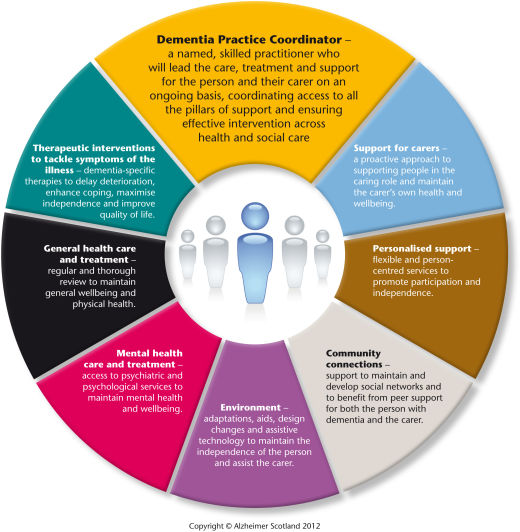The 8 Pillars Model sets out an integrated approach to supporting people with dementia and their families.
Author: Lindsay Kinnaird
The 8 Pillars Model sets out an integrated approach to supporting people with dementia and their families. It is based on a bio-psychosocial (includes social, psychological and biological factors) understanding of the illness and tackles the full range of factors that influence the experience of the illness.
The Model builds on key developments in relation to post-diagnostic support by providing a vision of how the care of people with dementia living at home with moderate to severe dementia can be similarly transformed.
The key aim of the 8 Pillars Model is to build the resilience of people with dementia and their carers to enable them to live in the community for as long as possible. It also aims to build on the one year post-diagnostic support guarantee to ensure the impact of the investment in early intervention is not lost.
Each factor of the illness influences every other factor, and impacts on the overall health and wellbeing of the person and his or her carer.
The 8 Pillars Model will provide each person with the best possible support to live in their own home.
The one year post-diagnostic guarantee will provide those newly diagnosed with early stage dementia with support adjusting and managing the likely impact of the illness, both emotionally and practically. The 8 Pillars Model will then provide a coordinated approach when people need support to live in the community.
However, there will be a proportion of those newly diagnosed who will require the 8 Pillars Model either immediately after diagnosis or in place of post-diagnostic support, as some people are diagnosed at a later stage, or progress more rapidly in their dementia.
Dementia is the interrelationship of neurological damage and psychosocial factors (neurological damage, social psychology, personality, physical and mental health, environment and life events); the experience of the illness is subjective and unique to each individual. A bio-psychosocial model of dementia brings together what is true in the medical and social models of the illness.
It provides a framework for understanding the range of factors that determine the nature of dementia, progression of the illness and appropriate interventions.
Effectively tackling the symptoms and consequences of dementia requires a coordinated range of health and social care interventions. The main intervention for dementia is human care and treatment; this encompasses a range of therapeutic, psychosocial and psychological treatments.
The experience of caring is also unique to each individual; it is influenced by a range of objective factors (relating to the tasks or activities of caring) and subjective (representing how the carer feels about their role).
Interventions to support the carer must meet their specific needs and circumstances in order to be effective.
Excess disability is created when people with dementia do not receive appropriate care and treatment for the symptoms of the illness. Without the right support, there is a gap between how people actually function and how they could potentially function. It is important to see the potential to improve the lives of people with moderate to severe dementia living at home.

The 8 Pillars Model combines the health and social care interventions required to respond to each aspect of the illness and provide support to the carer. It promotes independence, citizenship and the right to participate as fully as possible in society.
Demographic changes and financial challenges mean that current models of care are not sustainable in the longer term . The integration of health and social care provides an opportunity to create a structured, coordinated and strategic approach to community support for people with dementia and their carers.
The 8 Pillars Model provides local authorities and NHS boards with a blueprint for restructuring integrated dementia care so that resources are used to greatest effect.
For more information about the 8 Pillars Model visit:
http://www.alzscot.org/campaigning/eight_pillars_model_of_community_support
The publisher is Alzheimer Scotland.
The 8 Pillars Model of Community Support © Alzheimer Scotland 2012.
All Rights Reserved. No part of this paper may be reproduced in any form without permission from the publisher except for the quotation of brief passages in reviews.